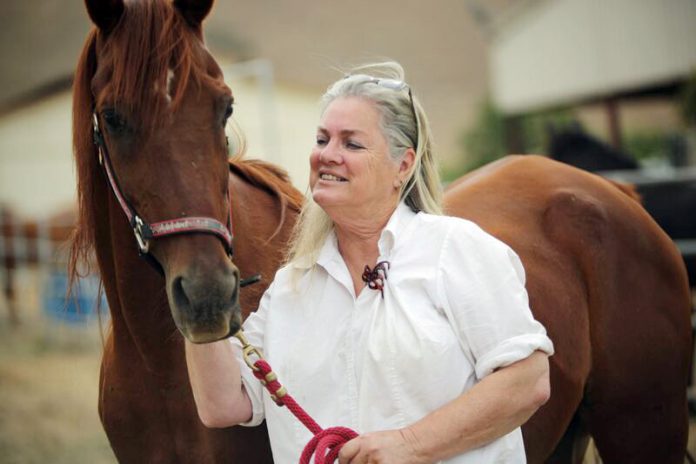
Touching a horse’s ears is usually a small task. But for Hollister resident Elizabeth Akers and a horse named Red, it’s a testament to the trust they built after the underweight equine arrived at her home.
“This was impossible to do,” Akers said, as she touched the horse’s muzzle and ears. “You could not touch his ears. He would fly away.”
The nonprofit Red’s Equines In Need Sanctuary—which started in November—is the first horse rescue that Akers knows of in Hollister.
Red—the nonprofit’s namesake—and nine other horses are getting a second lease on life off Orchard Road on a parcel formerly home to Ausaymas Veterinary Services. Akers doesn’t take surrenders but selects horses pulled from slaughter trucks, confiscated for abuse or at risk of euthanasia. At the same property, Akers runs a nonprofit dog rescue that takes Rhodesian Ridgebacks—a breed of dog originally bred for lion hunting—from shelters and finds them suitable homes.
Caring for horses is second nature for Akers who grew up in South Africa with sheep, Rhodesian Ridgeback dogs and hundreds of horses.
“I grew up in South Africa on a horse farm,” she said. “We taught people how to ride.”
She married an American and moved to England where she became certified instructor for grand prix—one of the highest levels possible— of dressage with the British Horse Society, Akers said.
Now about a year into running the equine rescue, it’s hard for Akers to name a favorite horse but she’s partial to Butter, a massive 7-year-old Friesian that arrived pregnant and with a terrible mistrust of people.
“She came in here with her ears pinned back and her teeth popping,” Akers said. “But I think she’s my favorite because she’s come a long way.”
Butter arrived with Mollie, a 7-year old massive Shire and Friesian cross that floats effortlessly from the lunge line in the arena but won’t tolerate a rider and has vision loss in one eye.
“She really is an impressive horse,” Akers said. “And when you stand next to her, she is really big.”
The costs of caring for the horses and rehabilitating them add up, with the expenses for feed, bedding and veterinarian bills for Mollie and Butter at about $7,000 to $8,000 each, Akers said. Bringing Red from 550 pounds to a more normal body weight of about 900 pounds from November to April likely cost another $9,000, she said.
That’s where the community steps in by donating money to cover the cost of feed, bedding, hoof care and veterinarian bills, she said.
Butter and Mollie came from Morgan Hill resident Humberto Rivas Uribe, whose 38 horses were seized by the Santa Clara County Animal Care and Control office in November after a colt died and others were found to be severely emaciated. Akers suspects Red may have been a victim of rough Mexican rodeo practices, that involve lassoing a horse’s feet or tripping them with wire, due to scars above his hooves, she said.
Despite her attachment to the horses, each of them—including Mollie and Red—will go up for adoption.
“If I could, I would keep them all but I’m a rescue so that’s not what I’m about,” she said.
Akers is not sure what she gets out of running rescues but she knows she loves the animals.
“I prefer being with the animals to people,” she said. “People can be very cruel. Animals are never cruel.”
To contribute to the nonprofit go to youcaring.com/reins-red-s-equines-in-need-sanctuary-406758. For more information about the horses and volunteer opportunities, go to HelpREINS.org or visit their Facebook page: facebook.com/REDSRESCUES.









